By Tim Spivey, lead planter of New Vintage Church (San Diego)
It’s time for everyone to start putting their “lists” out there. Not everyone enjoys these posts; I do. I like reading what others found to be particularly helpful, because it helps me get to know them a bit better and to cut through some of the flood of information that comes my way every day.
So, I’m putting together a mini-series of “Top 5″ lists. My hope is that by doing some top 5 lists (rather than one top 10 list), it might be a bit more helpful to you. The posts will be shorter and more targeted. Going top 5 means things have to be really good to make this list. These are books I read in 2013. They may or may not have been published this year. Most came out this year, but a few came out sooner, and I’m just now reading them.
Here are the five best books I read in 2013:
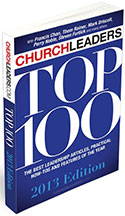 5. Church Leaders Top 100: 2013 Edition, by various authors. This is an anthology of the best 100 posts and articles from my friends at ChurchLeaders.com, (a most excellent website). There are articles in here from all sorts of familiar names: Rainer, Driscoll, Chan, etc. It’s a great read right before bed or over a morning cup of coffee. It can even be read as a “leadership devotional” of sorts — not to replace the Bible, but as a way to sharpen one’s leadership on a daily basis. The posts are broken down into categories, if you want to focus on a particular area. The Kindle edition is $4.99, which is a steal.
5. Church Leaders Top 100: 2013 Edition, by various authors. This is an anthology of the best 100 posts and articles from my friends at ChurchLeaders.com, (a most excellent website). There are articles in here from all sorts of familiar names: Rainer, Driscoll, Chan, etc. It’s a great read right before bed or over a morning cup of coffee. It can even be read as a “leadership devotional” of sorts — not to replace the Bible, but as a way to sharpen one’s leadership on a daily basis. The posts are broken down into categories, if you want to focus on a particular area. The Kindle edition is $4.99, which is a steal.
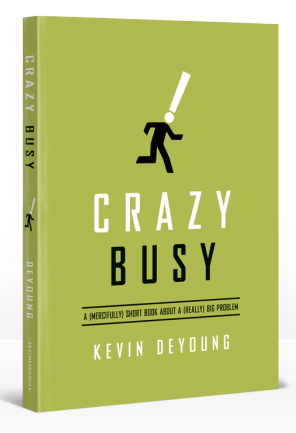 4. Crazy Busy: A (Mercifully) Short Book about a (Really) Big Problem, by Kevin DeYoung. A timely book taking a series of important, theological angles on one of today’s biggest spiritual issues: busyness that damages our souls. One of the most helpful chapters is one called “Stop Freaking Out About Your Kids,” where DeYoung writes of the dangers of child-centered families. He talks about the phenomenon of “Kindergarchy” — the rule of children and its negative impact on families. This is a wonderfully practical book that will really help you if you struggle with life chaos. (And don’t we all?)
4. Crazy Busy: A (Mercifully) Short Book about a (Really) Big Problem, by Kevin DeYoung. A timely book taking a series of important, theological angles on one of today’s biggest spiritual issues: busyness that damages our souls. One of the most helpful chapters is one called “Stop Freaking Out About Your Kids,” where DeYoung writes of the dangers of child-centered families. He talks about the phenomenon of “Kindergarchy” — the rule of children and its negative impact on families. This is a wonderfully practical book that will really help you if you struggle with life chaos. (And don’t we all?)
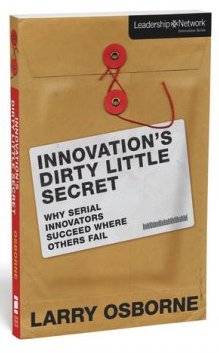 3. Innovation’s Dirty Little Secret: Why Serial Innovators Succeed Where Others Fail (Leadership Network Innovation Series), by Larry Osborne. Larry Osborne is both an excellent writer and a repository of more practical ministry insight than anyone I know. Among the many contributions of this little book are steps to keep people who innovate from dashing their vision upon the rocks. As a guy who loves dreaming and starting new things, this book was a sage word. This book also might be helpful to give to your elders/board as a way of demonstrating there is logic, and not just fantasy, in the process of innovation. If you all read it together, it will lower anxiety about new ideas and pave the way to more brisk implementation of vision.
3. Innovation’s Dirty Little Secret: Why Serial Innovators Succeed Where Others Fail (Leadership Network Innovation Series), by Larry Osborne. Larry Osborne is both an excellent writer and a repository of more practical ministry insight than anyone I know. Among the many contributions of this little book are steps to keep people who innovate from dashing their vision upon the rocks. As a guy who loves dreaming and starting new things, this book was a sage word. This book also might be helpful to give to your elders/board as a way of demonstrating there is logic, and not just fantasy, in the process of innovation. If you all read it together, it will lower anxiety about new ideas and pave the way to more brisk implementation of vision.
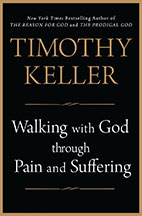 2. Walking With God Through Pain and Suffering, by Timothy Keller. Keller’s insights into this always-timely subject. Many have reviewed this book and applauded it, so I won’t do so in lengthy fashion here. However, to me, the most excellent facet of this book is Keller’s deconstruction of secular myths regarding pain and suffering. For that section alone, the book is worth buying and reading. I love nearly everything Keller writes, but this is my favorite since The Reason for God. He is in fine Lewisian form in this wonderful book.
2. Walking With God Through Pain and Suffering, by Timothy Keller. Keller’s insights into this always-timely subject. Many have reviewed this book and applauded it, so I won’t do so in lengthy fashion here. However, to me, the most excellent facet of this book is Keller’s deconstruction of secular myths regarding pain and suffering. For that section alone, the book is worth buying and reading. I love nearly everything Keller writes, but this is my favorite since The Reason for God. He is in fine Lewisian form in this wonderful book.
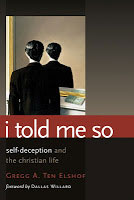 1. I Told Me So: Self-Deception and the Christian Life, by Gregg A. Ten Elshof. Aside from the brilliant title, this little book makes the case that we live in a chronically self-deceived society and self-deception is an ongoing struggle for us all. It’s written almost as lengthy observation with wisdom sprinkled throughout. Elshof is a Professor of Philosophy (it shows) who writes this magnificent little book in a way that’s accessible, but still has some intellectual girth to it. There is little else out there like it. This book opened my eyes to several nuances of self-deception —and I may actually make a short sermon series out of it. I thought it was that good.
1. I Told Me So: Self-Deception and the Christian Life, by Gregg A. Ten Elshof. Aside from the brilliant title, this little book makes the case that we live in a chronically self-deceived society and self-deception is an ongoing struggle for us all. It’s written almost as lengthy observation with wisdom sprinkled throughout. Elshof is a Professor of Philosophy (it shows) who writes this magnificent little book in a way that’s accessible, but still has some intellectual girth to it. There is little else out there like it. This book opened my eyes to several nuances of self-deception —and I may actually make a short sermon series out of it. I thought it was that good.
Here’s a taste, from page 11:
In the recent history of developed western society, though, racism earned a well-deserved promotion in the ordering of vices. This is all to the good. But with that promotion came an increased emotional cost in the recognition, “I am a racist.” If racism is worse than we thought, then ifs harder than it used to be to admit to yourself that you’re a racist. And it is at this point that life offers us the self-deception deal. You can experience the satisfaction that rightly belongs to the person who steers clear of the vice of racism if you can but convince yourself that you’re not a racist. Unsurprisingly, a great many people take the deal. What’s surprising is that they’re able to pull it off. And what’s alarming is that if I’ve taken the deal, it will seem to me (as it does in fact seem to me) that I have not.
It’s a thoroughly remarkable book. I couldn’t recommend it more highly.
So, there’s my top 5. If you have a favorite book or a list of your own on your blog, feel free to list it or link to it. Nothing beats a book!
 Tim Spivey is lead planter of New Vintage Church in San Diego, CA. Tim is also an adjunct professor of religion at Pepperdine University and purveyor of New Vintage Leadership, a blog offering cutting-edge insights on leadership and theology. He is the author of numerous articles and the book Jesus, the Powerful Servant.
Tim Spivey is lead planter of New Vintage Church in San Diego, CA. Tim is also an adjunct professor of religion at Pepperdine University and purveyor of New Vintage Leadership, a blog offering cutting-edge insights on leadership and theology. He is the author of numerous articles and the book Jesus, the Powerful Servant.
RELATED RESOURCES
How does your church view staff?
The perils of leadership lock-in
It’s always something — and that’s OK


